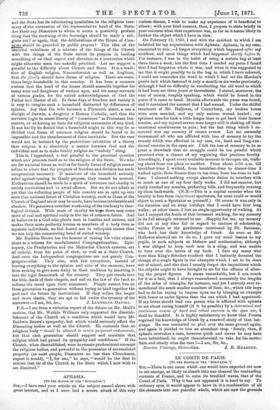APHASIA.
[TO THE EDITOR OF THE "SPECTATOR:]
have read your article on the subject named above with great interest, and as I once had a severe attack of this very curious disease, I wish to make my experience of it beneficial to others ; with your kind consent, then, I propose to state briefly in your columns what that experience was, so far as it seems likely to further the object which I have in view.
On February 12, 1860, I met with the accident to which I am indebted for my acquaintance with Aphasia. Aphasia, in my case, amounted to this :—I forgot everything which happened after my accident, and most things which had happened shortly before it. For instance, I was in the habit of using a certain bag at least three times a week, but the first time I needed my purse I found that I had forgotten where it was, and when it was suggested to me that it might possibly be in the bag to which I have referred, I could not remember the word to which I had set the Mordan's puzzle lock which fastened it only a month or six weeks previously, although I had no difficulty in recollecting the old word to which it had been set three years or thereabouts. I stated, moreover, the sum of money, roughly speaking, which would be found in the purse if it came to hand. Months afterwards the purse was found, and it contained the amount that I had named. 'Under the skilful treatment of Mr. Hallowes, of Canterbury, my broken bones were soon mended, and my only serious wound healed ; my sprained muscles took a little longer time to get back their former tension, and my injured nerves were longer still in shaking off their unnatural sensitiveness to pain ; but the last thing which I re- covered was my memory of recent events. Let me earnestly recommend all who are afflicted with loss of memory to try the remedy which was effectual in my case, viz., hard and long-con- tinued exercise in the open air. I felt the loss of memory to be so great a drawback that no struggle could be too painful which promised even a chance of my regaining that precious faculty Accordingly, I spent every available moment in the open air, walk- ing about from one place to another. From about 5.30 a.m. till breakfast-time I walked, from breakfast-time to dinner-time I walked again, from dinner-time to tea-time, from tea-time to bed- time. I allowed nothing except absolute duties to interfere with so much as one of my four daily walks. I did not saunter, but really exerted my muscles, preferring hills, and frequently running up them backwards. (N.B.—This is a capital exercise when the locality is free from impertinent spectators, for none could or would object to such a Spectator as yourself.) Of course it was only in the vacation and on stray holidays that I could have four long walks ; at other times, I lost no single opportunity of walking. At last I enjoyed the fruits of this incessant stalking, for my memory in its full strength returned to me. Happily for me, my memory did not at any time fail in regard to matters of scholarship, unlike Porson or the gentleman mentioned by Dr. Bateman, who both lost their knowledge of Greek. As soon as Mr. Hallowes allowed me to do so, I gave my usual lessons to my pupils, in such subjects as Hebrew and mathematics, although I was obliged to keep each arm in a sling, and was unable to turn over the leaves of my book. I dare say many who were then King's Scholars recollect that I instantly detected the change of a single figure in the examples which I set to be done out of school, and also that I usually forgot the impositions which the culprits ought to have brought to me for the offence of alter- ing the proper figures. It seems remarkable, but I can vouch for it as a fact, that I always remembered accurately the lengths of the sides of triangles, for instance, and yet I scarcely ever re- membered the much smaller numbers of lines, &c., which idle boys had to do for trying to impose upon me by bringing an example with fewer or easier figures than the one which I had appointed. If my letter should lead one person who is afflicted with aphasia to set about curing himself (if it be possible) by a determined and continuous course of hard and robust exercise in the open air, I shall be thankful. it is highly satisfactory to know that Porson regained his knowledge of Greek by a renewed study of that lan- guage. He was contented to plod over the same ground again, and again it yielded to him an abundant crop. - Surely, then, if aphasia overtakes a man, however quick and clever he may have been beforehand, he ought thenceforward to take for his motto : Sure and steady wins the race ?—I am, Sir, &c., Bourton Vicarage, Shrivenham. J. B. KEARNEY.


































 Previous page
Previous page